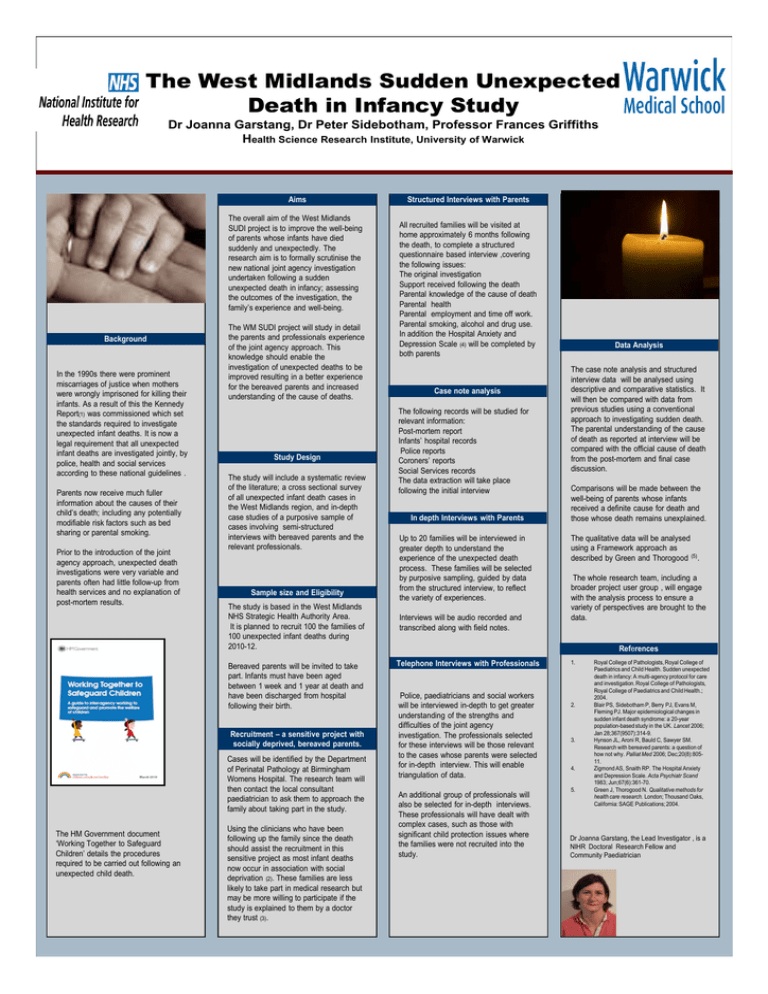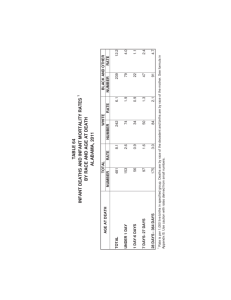The West Midlands Sudden Unexpected Death in Infancy Study H
advertisement

The West Midlands Sudden Unexpected Death in Infancy Study Dr Joanna Garstang, Dr Peter Sidebotham, Professor Frances Griffiths Health Science Research Institute, University of Warwick Aims The overall aim of the West Midlands SUDI project is to improve the well-being of parents whose infants have died suddenly and unexpectedly. The research aim is to formally scrutinise the new national joint agency investigation undertaken following a sudden unexpected death in infancy; assessing the outcomes of the investigation, the family’s experience and well-being. Background In the 1990s there were prominent miscarriages of justice when mothers were wrongly imprisoned for killing their infants. As a result of this the Kennedy Report(1) was commissioned which set the standards required to investigate unexpected infant deaths. It is now a legal requirement that all unexpected infant deaths are investigated jointly, by police, health and social services according to these national guidelines . Parents now receive much fuller information about the causes of their child’s death; including any potentially modifiable risk factors such as bed sharing or parental smoking. Prior to the introduction of the joint agency approach, unexpected death investigations were very variable and parents often had little follow-up from health services and no explanation of post-mortem results. The WM SUDI project will study in detail the parents and professionals experience of the joint agency approach. This knowledge should enable the investigation of unexpected deaths to be improved resulting in a better experience for the bereaved parents and increased understanding of the cause of deaths. Study Design The study will include a systematic review of the literature; a cross sectional survey of all unexpected infant death cases in the West Midlands region, and in-depth case studies of a purposive sample of cases involving semi-structured interviews with bereaved parents and the relevant professionals. Sample size and Eligibility The study is based in the West Midlands NHS Strategic Health Authority Area. It is planned to recruit 100 the families of 100 unexpected infant deaths during 2010-12. Bereaved parents will be invited to take part. Infants must have been aged between 1 week and 1 year at death and have been discharged from hospital following their birth. Recruitment – a sensitive project with socially deprived, bereaved parents. Cases will be identified by the Department of Perinatal Pathology at Birmingham Womens Hospital. The research team will then contact the local consultant paediatrician to ask them to approach the family about taking part in the study. The HM Government document ‘Working Together to Safeguard Children’ details the procedures required to be carried out following an unexpected child death. Using the clinicians who have been following up the family since the death should assist the recruitment in this sensitive project as most infant deaths now occur in association with social deprivation (2). These families are less likely to take part in medical research but may be more willing to participate if the study is explained to them by a doctor they trust (3). Structured Interviews with Parents All recruited families will be visited at home approximately 6 months following the death, to complete a structured questionnaire based interview ,covering the following issues: The original investigation Support received following the death Parental knowledge of the cause of death Parental health Parental employment and time off work. Parental smoking, alcohol and drug use. In addition the Hospital Anxiety and Depression Scale (4) will be completed by both parents Case note analysis The following records will be studied for relevant information: Post-mortem report Infants’ hospital records Police reports Coroners’ reports Social Services records The data extraction will take place following the initial interview In depth Interviews with Parents Up to 20 families will be interviewed in greater depth to understand the experience of the unexpected death process. These families will be selected by purposive sampling, guided by data from the structured interview, to reflect the variety of experiences. Interviews will be audio recorded and transcribed along with field notes. Data Analysis The case note analysis and structured interview data will be analysed using descriptive and comparative statistics. It will then be compared with data from previous studies using a conventional approach to investigating sudden death. The parental understanding of the cause of death as reported at interview will be compared with the official cause of death from the post-mortem and final case discussion. Comparisons will be made between the well-being of parents whose infants received a definite cause for death and those whose death remains unexplained. The qualitative data will be analysed using a Framework approach as described by Green and Thorogood (5). The whole research team, including a broader project user group , will engage with the analysis process to ensure a variety of perspectives are brought to the data. References Telephone Interviews with Professionals Police, paediatricians and social workers will be interviewed in-depth to get greater understanding of the strengths and difficulties of the joint agency investigation. The professionals selected for these interviews will be those relevant to the cases whose parents were selected for in-depth interview. This will enable triangulation of data. An additional group of professionals will also be selected for in-depth interviews. These professionals will have dealt with complex cases, such as those with significant child protection issues where the families were not recruited into the study. 1. 2. 3. 4. 5. Royal College of Pathologists, Royal College of Paediatrics and Child Health. Sudden unexpected death in infancy: A multi-agency protocol for care and investigation. Royal College of Pathologists, Royal College of Paediatrics and Child Health.; 2004. Blair PS, Sidebotham P, Berry PJ, Evans M, Fleming PJ. Major epidemiological changes in sudden infant death syndrome: a 20-year population-based study in the UK. Lancet 2006; Jan 28;367(9507):314-9. Hynson JL, Aroni R, Bauld C, Sawyer SM. Research with bereaved parents: a question of how not why. Palliat Med 2006; Dec;20(8):80511. Zigmond AS, Snaith RP. The Hospital Anxiety and Depression Scale. Acta Psychiatr Scand 1983; Jun;67(6):361-70. Green J, Thorogood N. Qualitative methods for health care research. London; Thousand Oaks, California: SAGE Publications; 2004. Dr Joanna Garstang, the Lead Investigator , is a NIHR Doctoral Research Fellow and Community Paediatrician


